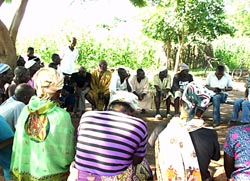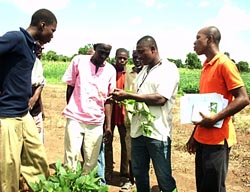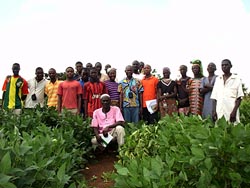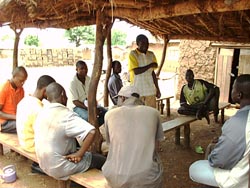In Part 1, published in the last Podcaster, we read how N2Africa established successful partnership with ADVANCE. This time, we report about this year’s training of ADVANCE’s Operational Communities in Tibali (Savelugu district) and Kpatribor (Karaga district), including in total 48 participants, of which 17% women.
On some occasions, ADVANCE engaged with the N2Africa team to train its farmers and/or its staff in application of the technologies and help them to understand the project concept. The training included legume agronomy, soil fertility and its improvement practises, BNF and soyabean Rhizobium inoculants technology, weed control, pest and disease management, post-harvest handling of legumes and value addition, linking farmers to markets, and involving women in community entrepreneurship. Another goal of the training was to get familiarized with the experiences of farmers concerning cultivation of legumes with N2Africa.
Some experiences shared by farmers:
- Fields cropped with legumes, especially groundnut, for about three years tend to produce a lot of biomass rather than grain yield.
- Having learned to practice legume-cereal based crop rotation system has helped to maintain the fertility of the soil over the years.
- Also testified by farmers who had purchased inoculants and used them in their own soyabean farms, inoculated plants seemed to have more biomass and pods. Even though farmers were not aware of beneficial effects of fertilizer on legumes before, they have now noticed the benefits of phosphorus fertilizers or YARAlegume.
- Training on value addition, and utilization of legume(s) in the household by WIAD (Women In Agricultural Development) has helped to reduce malnutrition, generate income and create employment for the women in their communities.
- Especially challenging and/or discouraging legume production were the prevalence of Rossette viruson groundnut fields, presence of pests like cowpea Maruca and Aphids, declining yields as a result of infestation by weeds, such as Striga spp., Commelina spp., Euphorbia spp. and sedge, poor market price for the farm produce and the inability to access credit from banks and other financial institution.
 |
 |
|
Farmers at the training at Tibali, Savelugu District |
Farm Liaison Officer explaining the importance of nodules to the farmers |
 |
 |
|
Group photograph of participants inside an inoculated soyabean demonstration plot at Tibali |
A section of participants at the Kpatribor training |
Farmers very much appreciated the timeliness of the training, and were convinced of the soyabean-rhizobium inoculants technology; such that they expressed their preparedness to purchase the inoculants at any time that it was available on the market. They also appreciated the education given them on the use of agro-inputs like YARAlegume, SSP and TSP fertilizers which could be used for the production of their legumes and were prepared to put in practice what they had learned from the training. The N2Africa team on the other hand was very happy with the opportunity to learn from the farmers.
Rev-Dr. Benjamin D. K. Ahiabor, Principal Investigator, N2Africa Project, SARI & Mr. Edwin K. Akley, Farm Liaison Officer, N2Africa Project, SARI
